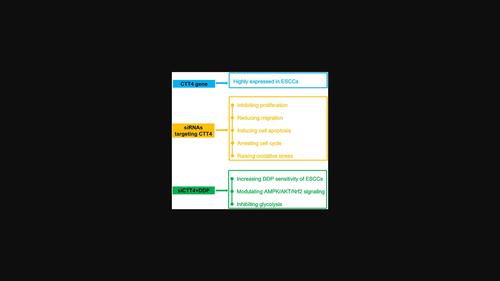当前位置:
X-MOL 学术
›
Mol. Carcinog.
›
论文详情
Our official English website, www.x-mol.net, welcomes your
feedback! (Note: you will need to create a separate account there.)
CCT4 knockdown enhances the sensitivity of cisplatin by inhibiting glycolysis in human esophageal squamous cell carcinomas
Molecular Carcinogenesis ( IF 3.0 ) Pub Date : 2022-09-14 , DOI: 10.1002/mc.23460 Jiarui Fang 1 , Yingchao Ma 1 , Ya Li 1 , Jianhui Li 2 , Xishen Zhang 1 , Xiao Han 1 , Shanshan Ma 1 , Fangxia Guan 1
Molecular Carcinogenesis ( IF 3.0 ) Pub Date : 2022-09-14 , DOI: 10.1002/mc.23460 Jiarui Fang 1 , Yingchao Ma 1 , Ya Li 1 , Jianhui Li 2 , Xishen Zhang 1 , Xiao Han 1 , Shanshan Ma 1 , Fangxia Guan 1
Affiliation

|
Esophageal squamous cell carcinoma (ESCC) is a common human malignancy characterized by late-stage diagnosis, metastasis, and poor prognosis. Cisplatin (DDP)-based chemotherapy has been the most predominant treatment for patients with ESCC. However, the high rate of DDP resistance and toxicity seriously hinder its clinical application. Then, the optimized strategy and mechanisms for ESCC to enhance DDP sensitivity are in great demand. Accumulating evidence have shown that chaperone proteins are closely related to the tumorigenesis and drug resistance of cancers. Chaperonin containing TCP1 complex 4 (CCT4) is a recent identified member of the family. However, its expression and function in ESCC have not been well illustrated. In this study, we found that CCT4 was highly expressed in human ESCC tissues and cell lines, and closely related to the poor prognosis. Moreover, CCT4 silence raised oxidative stress and inhibited glycolysis of ESCC cells, which significantly inhibited cell proliferation and migration, promoted apoptosis and caused cell cycle arrest in ESCC cells. Interestingly, CCT4 knockdown enhanced the sensitivity of KYSE150 cells to DDP by regulating AMPK/AKT/Nrf2 signaling pathway and inhibiting glycolysis ability. Taken together, our results indicate that targeting CCT4 may be a therapeutic target in ESCC patients, which provides a theoretical basis to enhance the sensitivity of DDP in ESCC.
中文翻译:

CCT4敲低通过抑制人食管鳞状细胞癌中的糖酵解增强顺铂的敏感性
食管鳞状细胞癌 (ESCC) 是一种常见的人类恶性肿瘤,其特点是晚期诊断、转移和预后不良。基于顺铂 (DDP) 的化疗一直是 ESCC 患者最主要的治疗方法。然而,DDP耐药率高、毒性大,严重阻碍了其临床应用。因此,迫切需要优化 ESCC 的策略和机制以提高 DDP 敏感性。越来越多的证据表明,伴侣蛋白与癌症的发生和耐药密切相关。含有 TCP1 复合物 4 (CCT4) 的伴侣蛋白是该家族最近发现的成员。然而,其在 ESCC 中的表达和功能尚未得到很好的说明。在这项研究中,我们发现 CCT4 在人类 ESCC 组织和细胞系中高表达,与预后不良密切相关。此外,CCT4 沉默会增加氧化应激并抑制 ESCC 细胞的糖酵解,从而显着抑制细胞增殖和迁移,促进细胞凋亡并导致 ESCC 细胞的细胞周期停滞。有趣的是,CCT4敲低通过调节AMPK/AKT/Nrf2信号通路和抑制糖酵解能力,增强了KYSE150细胞对DDP的敏感性。综上所述,我们的结果表明靶向 CCT4 可能是 ESCC 患者的治疗靶点,这为增强 DDP 在 ESCC 中的敏感性提供了理论基础。CCT4敲低通过调节AMPK/AKT/Nrf2信号通路和抑制糖酵解能力增强KYSE150细胞对DDP的敏感性。综上所述,我们的结果表明靶向 CCT4 可能是 ESCC 患者的治疗靶点,这为增强 DDP 在 ESCC 中的敏感性提供了理论基础。CCT4敲低通过调节AMPK/AKT/Nrf2信号通路和抑制糖酵解能力增强KYSE150细胞对DDP的敏感性。综上所述,我们的结果表明靶向 CCT4 可能是 ESCC 患者的治疗靶点,这为增强 DDP 在 ESCC 中的敏感性提供了理论基础。
更新日期:2022-09-14
中文翻译:

CCT4敲低通过抑制人食管鳞状细胞癌中的糖酵解增强顺铂的敏感性
食管鳞状细胞癌 (ESCC) 是一种常见的人类恶性肿瘤,其特点是晚期诊断、转移和预后不良。基于顺铂 (DDP) 的化疗一直是 ESCC 患者最主要的治疗方法。然而,DDP耐药率高、毒性大,严重阻碍了其临床应用。因此,迫切需要优化 ESCC 的策略和机制以提高 DDP 敏感性。越来越多的证据表明,伴侣蛋白与癌症的发生和耐药密切相关。含有 TCP1 复合物 4 (CCT4) 的伴侣蛋白是该家族最近发现的成员。然而,其在 ESCC 中的表达和功能尚未得到很好的说明。在这项研究中,我们发现 CCT4 在人类 ESCC 组织和细胞系中高表达,与预后不良密切相关。此外,CCT4 沉默会增加氧化应激并抑制 ESCC 细胞的糖酵解,从而显着抑制细胞增殖和迁移,促进细胞凋亡并导致 ESCC 细胞的细胞周期停滞。有趣的是,CCT4敲低通过调节AMPK/AKT/Nrf2信号通路和抑制糖酵解能力,增强了KYSE150细胞对DDP的敏感性。综上所述,我们的结果表明靶向 CCT4 可能是 ESCC 患者的治疗靶点,这为增强 DDP 在 ESCC 中的敏感性提供了理论基础。CCT4敲低通过调节AMPK/AKT/Nrf2信号通路和抑制糖酵解能力增强KYSE150细胞对DDP的敏感性。综上所述,我们的结果表明靶向 CCT4 可能是 ESCC 患者的治疗靶点,这为增强 DDP 在 ESCC 中的敏感性提供了理论基础。CCT4敲低通过调节AMPK/AKT/Nrf2信号通路和抑制糖酵解能力增强KYSE150细胞对DDP的敏感性。综上所述,我们的结果表明靶向 CCT4 可能是 ESCC 患者的治疗靶点,这为增强 DDP 在 ESCC 中的敏感性提供了理论基础。











































 京公网安备 11010802027423号
京公网安备 11010802027423号